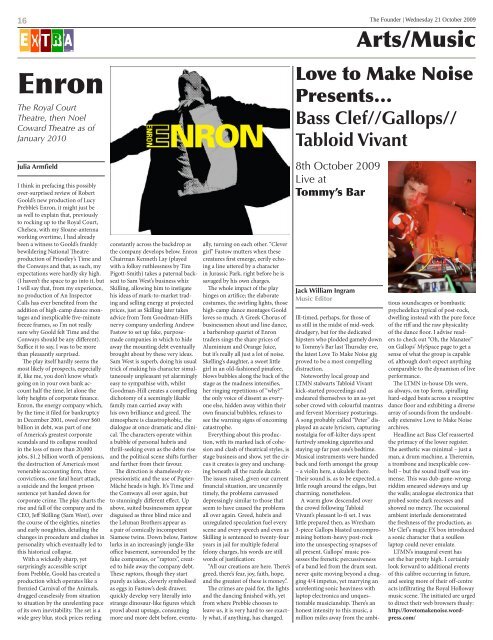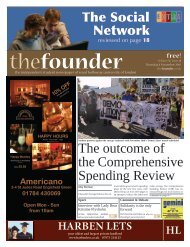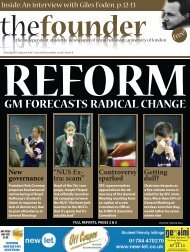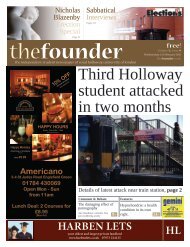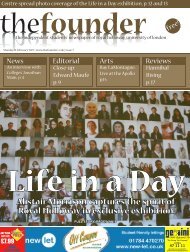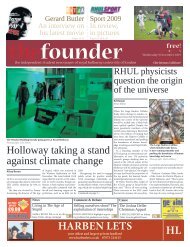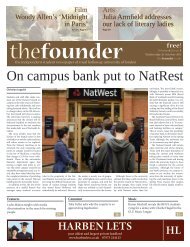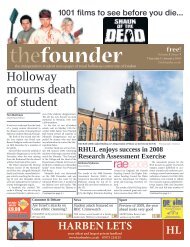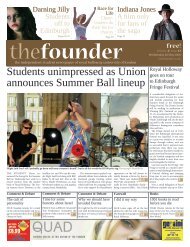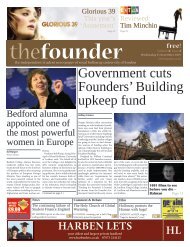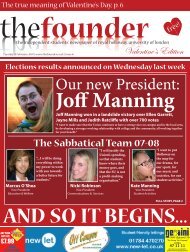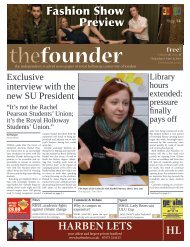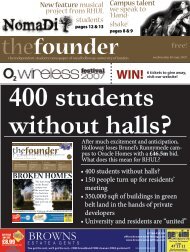Alissia Bevan - The Founder
Alissia Bevan - The Founder
Alissia Bevan - The Founder
Create successful ePaper yourself
Turn your PDF publications into a flip-book with our unique Google optimized e-Paper software.
16 <strong>The</strong> <strong>Founder</strong> | Wednesday 21 October 2009<br />
E X T R A<br />
Enron<br />
<strong>The</strong> Royal Court<br />
<strong>The</strong>atre, then Noel<br />
Coward <strong>The</strong>atre as of<br />
January 2010<br />
Arts/Music<br />
Love to Make Noise<br />
Presents…<br />
Bass Clef//Gallops//<br />
Tabloid Vivant<br />
Julia Armfield<br />
I think in prefacing this possibly<br />
over-surprised review of Robert<br />
Goold’s new production of Lucy<br />
Prebble’s Enron, it might just be<br />
as well to explain that, previously<br />
to rocking up to the Royal Court,<br />
Chelsea, with my Sloane-antenna<br />
working overtime, I had already<br />
been a witness to Goold’s frankly<br />
bewildering National <strong>The</strong>atre<br />
production of Priestley’s Time and<br />
the Conways and that, as such, my<br />
expectations were hardly sky high.<br />
(I haven’t the space to go into it, but<br />
I will say that, from my experience,<br />
no production of An Inspector<br />
Calls has ever benefited from the<br />
addition of high-camp dance montages<br />
and inexplicable five-minute<br />
freeze frames, so I’m not really<br />
sure why Goold felt Time and the<br />
Conways should be any different).<br />
Suffice it to say, I was to be more<br />
than pleasantly surprised.<br />
<strong>The</strong> play itself hardly seems the<br />
most likely of prospects, especially<br />
if, like me, you don’t know what’s<br />
going on in your own bank account<br />
half the time, let alone the<br />
lofty heights of corporate finance.<br />
Enron, the energy company which,<br />
by the time it filed for bankruptcy<br />
in December 2001, owed over $60<br />
billion in debt, was part of one<br />
of America’s greatest corporate<br />
scandals and its collapse resulted<br />
in the loss of more than 20,000<br />
jobs, $1.2 billion worth of pensions,<br />
the destruction of America’s most<br />
venerable accounting firm, three<br />
convictions, one fatal heart attack,<br />
a suicide and the longest prison<br />
sentence yet handed down for<br />
corporate crime. <strong>The</strong> play charts the<br />
rise and fall of the company and its<br />
CEO, Jeff Skilling (Sam West), over<br />
the course of the eighties, nineties<br />
and early noughties, detailing the<br />
changes in procedure and clashes in<br />
personality which eventually led to<br />
this historical collapse.<br />
With a wickedly sharp, yet<br />
surprisingly accessible script<br />
from Prebble, Goold has created a<br />
production which operates like a<br />
frenzied Carnival of the Animals,<br />
dragged ceaselessly from situation<br />
to situation by the unrelenting pace<br />
of its own inevitability. <strong>The</strong> set is a<br />
wide grey blur, stock prices reeling<br />
constantly across the backdrop as<br />
the company develops below. Enron<br />
Chairman Kenneth Lay (played<br />
with a folksy ruthlessness by Tim<br />
Pigott-Smith) takes a paternal backseat<br />
to Sam West’s business whiz<br />
Skilling, allowing him to instigate<br />
his ideas of mark-to-market trading<br />
and selling energy at projected<br />
prices, just as Skilling later takes<br />
advice from Tom Goodman-Hill’s<br />
nervy company underling Andrew<br />
Fastow to set up fake, purposemade<br />
companies in which to hide<br />
away the mounting debt eventually<br />
brought about by these very ideas.<br />
Sam West is superb, doing his usual<br />
trick of making his character simultaneously<br />
unpleasant yet alarmingly<br />
easy to sympathise with, whilst<br />
Goodman-Hill creates a compelling<br />
dichotomy of a seemingly likable<br />
family man carried away with<br />
his own brilliance and greed. <strong>The</strong><br />
atmosphere is claustrophobic, the<br />
dialogue at once dramatic and clinical.<br />
<strong>The</strong> characters operate within<br />
a bubble of personal hubris and<br />
thrill-seeking even as the debts rise<br />
and the political scene shifts further<br />
and further from their favour.<br />
<strong>The</strong> direction is shamelessly expressionistic<br />
and the use of Papier-<br />
Mâché heads is high. It’s Time and<br />
the Comways all over again, but<br />
to stunningly different effect. Up<br />
above, suited businessmen appear<br />
disguised as three blind mice and<br />
the Lehman Brothers appear as<br />
a pair of comically incompetent<br />
Siamese twins. Down below, Fastow<br />
lurks in an increasingly jungle-like<br />
office basement, surrounded by the<br />
fake companies, or “raptors”, created<br />
to hide away the company debt.<br />
<strong>The</strong>se raptors, though they start<br />
purely as ideas, cleverly symbolised<br />
as eggs in Fastow’s desk drawer,<br />
quickly develop very literally into<br />
strange dinosaur-like figures which<br />
prowl about upstage, consuming<br />
more and more debt before, eventually,<br />
turning on each other. “Clever<br />
girl” Fastow mutters when these<br />
creatures first emerge, eerily echoing<br />
a line uttered by a character<br />
in Jurassic Park, right before he is<br />
savaged by his own charges.<br />
<strong>The</strong> whole impact of the play<br />
hinges on artifice; the elaborate<br />
costumes, the swirling lights, those<br />
high-camp dance montages Goold<br />
loves so much. A Greek Chorus of<br />
businessmen shout and line dance,<br />
a barbershop quartet of Enron<br />
traders sings the share prices of<br />
Aluminium and Orange Juice,<br />
but it’s really all just a lot of noise.<br />
Skelling’s daughter, a sweet little<br />
girl in an old-fashioned pinafore,<br />
blows bubbles along the back of the<br />
stage as the madness intensifies,<br />
her ringing repetitions of “why?”<br />
the only voice of dissent as everyone<br />
else, hidden away within their<br />
own financial bubbles, refuses to<br />
see the warning signs of oncoming<br />
catastrophe.<br />
Everything about this production,<br />
with its marked lack of cohesion<br />
and clash of theatrical styles, is<br />
stage business and show, yet the circus<br />
it creates is grey and unchanging<br />
beneath all the razzle dazzle.<br />
<strong>The</strong> issues raised, given our current<br />
financial situation, are uncannily<br />
timely, the problems canvassed<br />
depressingly similar to those that<br />
seem to have caused the problems<br />
all over again. Greed, hubris and<br />
unregulated speculation fuel every<br />
scene and every speech and even as<br />
Skilling is sentenced to twenty-four<br />
years in jail for multiple federal<br />
felony charges, his words are still<br />
words of justification:<br />
“All our creations are here. <strong>The</strong>re’s<br />
greed, there’s fear, joy, faith, hope,<br />
and the greatest of these is money.”.<br />
<strong>The</strong> crimes are paid for, the lights<br />
and the dancing finished with, yet<br />
from where Prebble chooses to<br />
leave us, it is very hard to see exactly<br />
what, if anything, has changed.<br />
8th October 2009<br />
Live at<br />
Tommy’s Bar<br />
Jack William Ingram<br />
Music Editor<br />
Ill-timed, perhaps, for those of<br />
us still in the midst of mid-week<br />
drudgery, but for the dedicated<br />
hipsters who plodded gamely down<br />
to Tommy’s Bar last Thursday eve,<br />
the latest Love To Make Noise gig<br />
proved to be a most compelling<br />
distraction.<br />
Noteworthy local group and<br />
LTMN stalwarts Tabloid Vivant<br />
kick-started proceedings and<br />
endeared themselves to an as-yet<br />
sober crowd with colourful mantras<br />
and fervent Morrissey posturings.<br />
A song probably called “Peter” displayed<br />
an acute lyricism, capturing<br />
nostalgia for off-kilter days spent<br />
furtively smoking cigarettes and<br />
staying up far past one’s bedtime.<br />
Musical instruments were handed<br />
back and forth amongst the group<br />
– a violin here, a ukulele there.<br />
<strong>The</strong>ir sound is, as to be expected, a<br />
little rough around the edges, but<br />
charming, nonetheless.<br />
A warm glow descended over<br />
the crowd following Tabloid<br />
Vivant’s pleasant lo-fi set. I was<br />
little prepared then, as Wrexham<br />
3-piece Gallops blasted uncompromising<br />
bottom-heavy post-rock<br />
into the unsuspecting synapses of<br />
all present. Gallops’ music possesses<br />
the frenetic percussiveness<br />
of a band led from the drum seat,<br />
never quite moving beyond a chugging<br />
4/4 impetus, yet marrying an<br />
unrelenting sonic heaviness with<br />
laptop electronica and unquestionable<br />
musicianship. <strong>The</strong>re’s an<br />
honest intensity to this music, a<br />
million miles away from the ambitious<br />
soundscapes or bombastic<br />
psychedelica typical of post-rock,<br />
dwelling instead with the pure force<br />
of the riff and the raw physicality<br />
of the dance floor. I advise readers<br />
to check out “Oh, the Manatee”<br />
on Gallops’ MySpace page to get a<br />
sense of what the group is capable<br />
of, although don’t expect anything<br />
comparable to the dynamism of live<br />
performance.<br />
<strong>The</strong> LTMN in-house DJs were,<br />
as always, on top form, spiralling<br />
hard-edged beats across a receptive<br />
dance floor and exhibiting a diverse<br />
array of sounds from the undoubtedly<br />
extensive Love to Make Noise<br />
archives.<br />
Headline act Bass Clef reasserted<br />
the primacy of the lower register.<br />
<strong>The</strong> aesthetic was minimal – just a<br />
man, a drum machine, a <strong>The</strong>remin,<br />
a trombone and inexplicable cowbell<br />
– but the sound itself was immense.<br />
This was dub-gone-wrong;<br />
riddim smeared sideways and up<br />
the walls; analogue electronica that<br />
probed some dark recesses and<br />
showed no mercy. <strong>The</strong> occasional<br />
ambient interlude demonstrated<br />
the freshness of the production, as<br />
Mr Clef ’s magic FX box introduced<br />
a sonic character that a soulless<br />
laptop could never emulate.<br />
LTMN’s inaugural event has<br />
set the bar pretty high. I certainly<br />
look forward to additional events<br />
of this calibre occurring in future,<br />
and seeing more of their off-centre<br />
acts infiltrating the Royal Holloway<br />
music scene. <strong>The</strong> initiated are urged<br />
to direct their web browsers thusly:<br />
http://lovetomakenoise.wordpress.com/


